I spent a packed week in Seattle promoting High-Tech Housewives at Brick + Mortar Books in Redmond and Ada’s Technicaly Books. Thank you to all that came out to support the events!
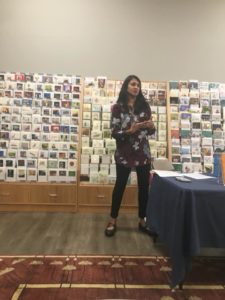
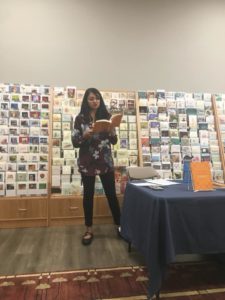

I spent a packed week in Seattle promoting High-Tech Housewives at Brick + Mortar Books in Redmond and Ada’s Technicaly Books. Thank you to all that came out to support the events!


Today, I had a great discussion about High-Tech Housewives at the Redmond Library. Thanks to all who came out!

Thank you to the Gender, Women and Sexuality Studies department and the South Asia Center at UW for hosting me. I presented on High-Tech Housewives and my new research on South Asian immigration activism. It was a packed house!
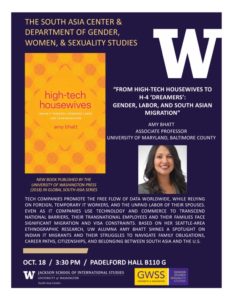
Today, I was featured on NPR’s The Academic Minute as part of Timely Topics Week. In this segment, I discuss family separations in the Trump era. See Family separations (Academic Minute), and additional coverage (Inside Higher Ed).
Check out my piece in The Conversation about India’s historic ruling in favor of LGBTQ rights!
From India’s sodomy ban, now ruled illegal, was a British colonial legacy:
“The Indian Supreme Court has legalized homosexuality, overturning a 157-year ban on consensual gay sex.
In a nearly 500-page unanimous decision issued on Sept. 6, India’s highest court affirmed that “whenever the constitutional courts come across a situation of transgression or dereliction in the sphere of fundamental rights which are also the basic human rights of a section, howsoever small part of the society, then it is for the constitutional courts to ensure that constitutional morality prevails over social morality.”
Gay rights advocates worldwide celebrated the legal victory, which came after nearly a decade of contentious court battles against a British colonial law criminalizing homosexual acts….”
I had the pleasure of reading from my book at Third Place Books Seward Park, in Seattle WA this summer. We had a nice turn out and I got a great shout-out from Seattle’s Independent Weekly, The Stranger!
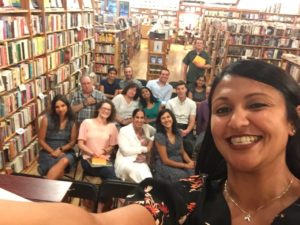

I had the chance to speak with the amazing Heather Mills, attorney, negotiation specialist, and owner of Women Who Ask for her monthly podcast. Check out the full interview on her blog here:
Join us Wed @ noon PT for an Interview with Dr. Amy Bhatt: The Career Choices that Have the Biggest Impact on Our Long Term Earnings
Posted by Women Who Ask with Heather Mills on Wednesday, May 16, 2018
In May, I had the opportunity to write for The Society Pages, a publication of the Council on Contemporary Families. You can check out my piece here!
Excerpt from “Keeping ‘Dependents’ Dependent”:
“On April 24, the United States Citizenship and Immigration Services rang the death knell on work authorization for spouses of high-skilled immigrant workers. Under the direction of the White House, the USCIS conducted an audit of the H-1B guest worker program, specifically to see if it complies with the President’s Buy American, Hire American executive order. In a report submitted to the Senate Judiciary Committee, the director of the USCIS proposed sweeping changes to the program, including removing regulations that would allow the spouses of H-1B workers to obtain work permits.
Despite being an established program for almost thirty years, the H-1B program has become a target for the current administration. The H-1B visa program first came into existence after the passage of the 1990 Immigration Act. As the tech boom of the 1990s and rising fears about “Y2K” created a demand for technically-trained labor, U.S. companies began to seek workers from around the world. The H-1B is given to workers in “specialized and complex” jobs. Typically issued for three to six years, the visa allows employers to hire foreign workers.”
My latest book, High-Tech Housewives: Indian IT Migrants, Gendered Labor, and Transmigration, was published by The University of Washington Press! You can order you copy here:
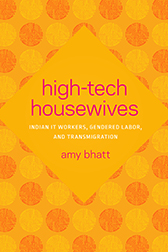
Tech companies such as Google, Amazon, and Microsoft promote the free flow of data worldwide, while relying on foreign temporary IT workers to build, deliver, and support their products. However, even as IT companies use technology and commerce to transcend national barriers, their transnational employees face significant migration and visa constraints. In this revealing ethnography, Amy Bhatt shines a spotlight on Indian IT migrants and their struggles to navigate career paths, citizenship, and belonging as they move between South Asia and the United States.
Through in-depth interviews, Bhatt explores the complex factors that shape IT transmigration and settlement, looking at Indian cultural norms, kinship obligations, friendship networks, gendered and racialized discrimination in the workplace, and inflexible and unstable visa regimes that create worker vulnerability. In particular, Bhatt highlights women’s experiences as workers and dependent spouses who move as part of temporary worker programs. Many of the women interviewed were professional peers to their husbands in India but found themselves “housewives” stateside, unable to secure employment because of visa restrictions. Through her focus on the unpaid and feminized placemaking and caregiving labor these women provide, Bhatt shows how women’s labor within the household is vital to the functioning of the flexible and transnational system of IT itself.
“Mapping the arrival of H-1B workers from India and marriage migration, their lives in Seattle, and following them on their return to India, High-Tech Housewives provides a longue durée perspective on Indian transmigrants. Thick with descriptive narrative, High-Tech Housewives takes us into the lives of these individuals.”
-Sharmila Rudrappa, author of Discounted Life: The Price of Global Surrogacy in India“High-Tech Housewives makes a significant contribution to our understanding of the transnational circulation of technical labor, by highlighting the role of the household in the reproduction of the global Indian IT workforce. Through rich ethnographic detail, the book documents the experiences and predicaments of dependent spouses of temporary H1-B visa workers in the US and after their return to India, providing a human face to current debates on immigration. It is a welcome addition to the transnational and migration studies, gender and labor studies, and anthropology.”
-Carol Upadhya, author of Reengineering India: Work, Capital, and Class in an Offshore Economy
“A seminal book about how US immigration policy influences the lives of temporary workers and their families, many of whom find themselves in liminal spaces, in between nations, homes, and employment. Amy Bhatt provides readers with a clearer understanding of the problematic positions that Indian temporary workers and their families face as a result of immigration laws that prioritize economic gain over the needs of migrants.”
-Deepa Iyer, author of We Too Sing America: South Asian, Arab, Muslim, and Sikh Immigrants Shape Our Multiracial Future
“A thoughtful examination of how immigrant women build lives and labor within the constraints of the US state, high-tech capitalism, and transnationalism, and enable a global economy.”
-Pawan Dhingra, Amherst College
“High-Tech Housewives provides a long overdue study on the large but overlooked group of temporary migrant professionals in the United States, H-1B workers, and their dependents, H-4 visa holders. This book makes an invaluable contribution by focusing on the plight of H-4 dependents, the wives, who are multiply displaced by their disqualification from labor market participation, increasing their dependence on their husbands and heightening the isolation of their migration.”
-Rhacel Salazar Parreñas, author of Servants of Globalization: Migration and Domestic Work
“Amy Bhatt offers an empirically rich, theoretically nuanced account of high-tech immigration to the United States, drawing important attention to the interplay of gender, occupation, and family dynamics. This book is essential reading on how the ‘temporary’ migration of high-skilled workers and their families are fundamentally reshaping our notions of citizenship, social relations, and national belonging.”
-Karthick Ramakrishnan, director of AAPI Data and professor of public policy, University of California Riverside
I, along with several great colleagues, were quoted in this piece by Catalina Sofia Dansberger Duque about the #MeToo movement in Ms. Magazine:
“In India, #MeToo is hardly the first digital turning point in the fight to end rape and sexual assault. “An attempt has been made in India to protect women,” says Amy Bhatt, associate professor of Gender and Women’s Studies, “but legislation has mostly been used to limit women, rather than to protect them. Young women activists are pushing against that and using these type of hybrid online and in personal awareness-raising campaigns to create change and demand accountability.””